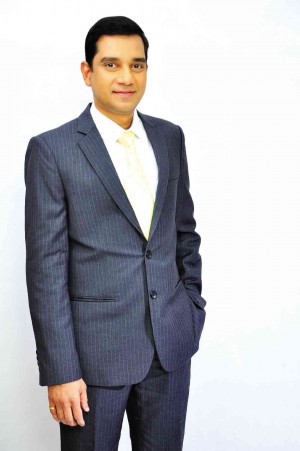Everything seems to have fallen into place for Rajan Komarasu.
Tapped by Concepcion Carrier Airconditioning Co. (CCAC) to establish and head a new division in the Philippines, Komarasu was given the perfect opportunity to go back to a country he loves, and to work for a great friend and mentor.
“I love the Philippines. My family loves the Philippines and they said, the moment we get a chance (to) go back to the Philippines, we will go. You see, the Philippines is a growing economy among other Asian countries. After China, I believe the Philippines is another one that is actually growing fast. So I wanted to be part of that change,” Komarasu explains.
“Jojo (CCAC chief executive officer Raul Joseph Concepcion) and I have a very strong relationship. He’s not only a great boss, he’s a great friend, a great mentor to me. So for him to ask me to come back and manage his business, just imagine the trust. So, that’s why I’m in,” he tells the Inquirer in a recent interview.
Komarasu, who has a degree in Business from Curtin University in Australia and a Chartered Accountant certification from Singapore, came back early 2013 to head the Building and Industrial Solutions of CCAC (Concepcion BIS), and was assigned this year to serve as CEO of Otis E&M Philippines, both of which are subsidiaries of Concepcion Industrial Corp.
Concepcion BIS primarily provides building solutions to residential developers, commercial, industrial and government sectors.
His first stint at CCAC was in 2007, when he assumed several positions in purchasing, human resources and aftermarket parts sales, before becoming the company’s chief financial officer.
Komarasu then went to Shanghai, China in 2011 to serve as director for financial planning and analysis of United Technologies Climate, Controls and Security in Shanghai.
The first task at hand for Komarasu was to grow a not-so-entirely new business, and realize the company’s vision of becoming the preferred and leading building solutions partner in the country.
“So we took a look at the business model and identified what we need to fix, and the gaps where we needed to catch up. So what we wanted was to become an end-to-end solutions provider. In the past, the model has been selling you the boxes. You tell us what you want, we’ll sell you and then after a while, if the unit fails, we’ll come in and repair,” says Komarasu.
This business model, however, has been reviewed and revised, paving the way for the formation of the BIS division early last year.
“Right now, the model has changed in such a way that, if you let us know the project, we come in, we talk to your consultants, we talk to your architects, we talk to your engineers. We are part of your design stage, and we let you know the correct applications for your buildings,” he adds.
According to Komarasu, the Concepcion Group has two divisions, one of which is called Consumer Solutions Group (CSG), while the other one is BIS.
CCAC has always been strong on the retail consumer side, but has not been focusing much on its commercial business or the B2B.
“Because of the growing trends in the commercial site, and the booming construction industry, we decided to carve out the company and get one division to focus on the commercial market, and another on the residential market,” Komarasu explains. “The commercial segment has been growing pretty fast. We see that in the number of buildings popping up in Manila and the provincial cities…. We need to go after the commercial market. This is about carving out an existing business and putting in more people to now focus on that particular sector.”
Komarasu admits that this is not exactly the first time CCAC is offering an end-to-end service.
“Now, we come in as a total solutions provider. It’s not only about selling the products or being part of the designs process. It also matters the way our products are installed, and even the materials used to install these. We’ve got to start at the beginning stage,” he says.
“Many times, the drawings and applications have been changed based on our advice because we find that some contractors tend to overspend or underspend. And we have done a lot of damage control. We have saved a lot of money for the developers because we come in and we give them advance notice, so they are quick enough to rectify their plans.”
Strengthening the BIS segment is expected to help CCAC further cement its already strong foothold in the market.
“To further thrive in the Philippine construction industry, you have to have a different mindset. It’s not about selling boxes. We are moving away from selling boxes to selling solutions. It’s very common in IT. They are no longer offering just computers. They are offering different services, servers, and data services. It’s all about … getting things right for the owners and developers,” Komarasu says.
So far, the feedback from clients, including the developers, has been more than positive.
“Jojo has talked to some of the developers and they are very happy actually. I can’t say really that our move is unique, as I think it’s a global practice. But it’s still immature in the Philippines,” he says.
Right now, Komarasu is more than just glad that he took on such a challenging role.
“I believe that we are the only one in this field to provide such services. We have been touching base with consultants, architects and engineers, and we let them realize their value and the solutions that we can provide them. Our role now is to teach them the proper way of installing, and oversee things to ensure nothing goes wrong. Such kind of service has been very much acceptable to them,” he concludes.
